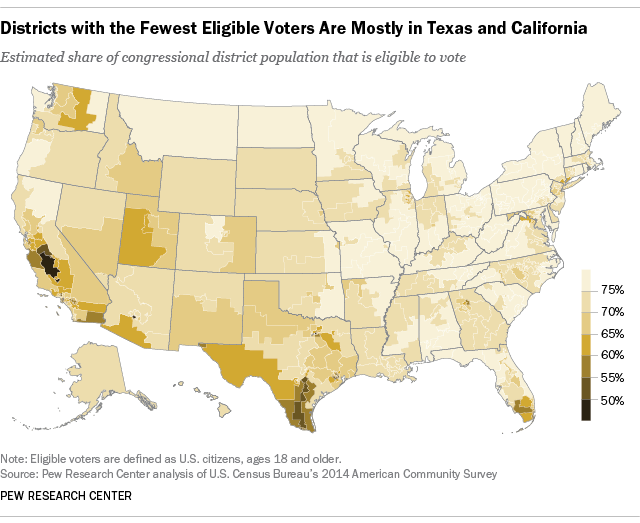Counting Non-Voters Impacts Balance of Representation
The impact on elections could be significant when considering the difference between mere residents and voters, because districts with nearly equal numbers of residents can be dramatically different when looking at the number of eligible voters in each district. Should the Supreme Court rule in favor of the Texas appellants, the impact will be greatest on districts with large Latino populations, which often center in high density areas in urban areas. That is because in areas such as East Los Angeles, California, and several large urban areas in Texas, the “people” now afforded representation include a large proportion of illegals along with a high number of non-voting age minors. The group ineligible to vote also includes residents who may have former felony convictions, who do not meet residency requirements, or who may be mentally incapacitated.
The larger question is who should realistically be able to vote for representation and thereby be represented by their elected official. And of course, the underlying issue is political, not philosophical. Urban areas with high density and large populations of Latinos and Asians are predominantly Democrat and benefit from the skewed inclusion of the total number of “people” in a district. Republicans are more often found in less urban areas, and their makeup includes fewer of these ethnic groups, which means that the current counting is very helpful in establishing more representation for the Democrats.
If the court decides that only eligible voters can be considered in drawing voter districts, then more whites and Republicans will have to be incorporated into these urban districts that are currently heavily Latino or Asian. And that could impact Hispanic representation in the House of Representatives, whose numbers have grown from 5 in 1973 to 28 in 2013.
As the map (below) might suggest, there’s a strong negative correlation between share of eligible voters and share of Hispanic population. Of the 25 districts with the highest Hispanic population shares, 18 also are among the 25 districts with the lowest eligible-voter share. This is because so many Hispanics aren’t eligible to vote, either because they’re not U.S. citizens or because they’re younger than 18. By our calculations, only about 46% of the nation’s more than 55 million Hispanics are eligible to vote.
There also are clear partisan differences between districts with high and low shares of eligible voters. Of the 33 districts where voting-age citizens make up less than 60% of the population, 28 are held by Democrats; Democrats represent 18 of the lowest-ranking 20. On the other end, Republicans represent 35 of the 47 districts where 77% or more of the population are voting-age citizens, and 17 of the highest 20.
The case now being reviewed in the Supreme Court was brought by Sue Evenwel and Edward Pfenninger regarding voting districts for the Texas Senate elections, and it asked the lower court to required states to only count eligible voters when drawing voting districts. They initially lost the case in the lower court and are now being represented by the Project on Fair Representation, an advocacy group that is active in considering fair voting policies.
The case’s partisan aspect was not mentioned during arguments before the court, but the four Democratic justices asked questions that were generally favorable towards counting every single person in a district, while the five Republican justices focused more on voter equality and the importance of representation being limited to those who legally have the right to participate in choosing who will represent them before the state.
It is vexing that this is even a question. That non-legal residents and others who have no voting rights are considered of equal weight with legal citizens with the right to vote is preposterous. At what point must we say that citizenship is a meaningless designation? That the Democrats would insist that their representation should be weighted more heavily because of their large number of illegals or non-eligible voters is not a surprise. That they courts would sanction this is outrageous. The public is unlikely to hear about this travesty for now, but should the court decide in favor of redistricting to include only voting-eligible citizens, the main stream press will wail and moan about the inhumanity and the lack of compassion shown, ignoring the unfair nature to citizens as it stands today.
Source: www.pewresearch.org


We The People the Citizen, Any ruling made by the court that says people, person is the citizen useless other whys stated what people they are talking about. We The People are not going to take these games form the Federal, State, Local an Supreme Court that has been stacked full of treasonous, traitors and anti America much long. We know you are trying to keep Trump out of the White House. You most know civil war will brake as soon as that happens. At the end of the civil war We The People will do away with all of Federal and The Supreme Court as it is now. We The People will start over with out all you rules, regulations. and laws. We The People will have the vote on all rules, regulations and laws. There will be no more you passing them until We The People have a vote and We The People vote it in. The system we have now you broke We The People will fit it.